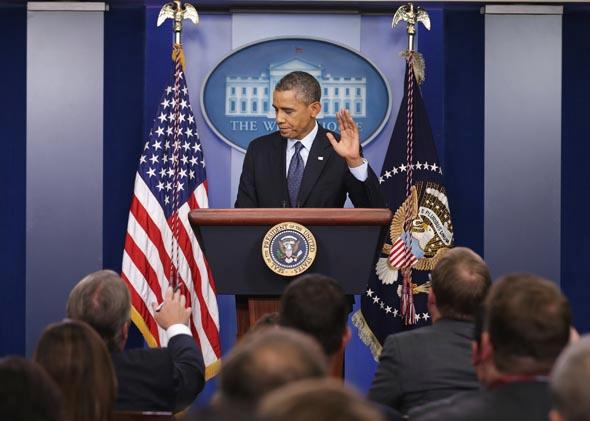President Obama keeps saying he will not raise the debt ceiling on his own. “Look, our view is the Constitution gives Congress—not the president—the authority to borrow money, and only Congress can increase the debt ceiling,” Press Secretary Jay Carney said last week. “Which is why it’s time that they do their job and raise the debt ceiling, authorize the Treasury to pay the bills that Congress racked up.” Obama dismissed the idea, suggesting it wouldn’t reassure the markets: “So a lot of the strategies that people have talked about, well the president can roll out a big coin, or he can resort to some other constitutional measure, what people ignore is that, ultimately, what matters is, what will the people who are buying Treasury bills think.”
Legal scholars and historians (including one of us) have been making the argument that Obama does indeed have the power to declare, without Congress, that he’ll pay off the nation’s debt. Our view is that he can cite his inherent emergency powers under the Constitution once financial markets begin to freeze up. Others have noted that the 14th Amendment provides that the “the validity of the public debt … shall not be questioned,” and have argued that while it instructs Congress, not the president, to protect the debt, the president can act if Congress violates its duty.
The White House will keep insisting it doesn’t want to act on its own because doing so would be politically risky. The president would much rather Congress fold. There is always some residual risk from doing something that hasn’t been done before, so we understand the reluctance. But if there’s no deal by the end of next week and financial markets get wobbly, Obama should just go ahead. He is not shy about advancing executive power in other domains. Why not put the country and the world financial markets out of their misery? Wouldn’t the polls reflect support and relief? And wouldn’t the American political system be better off if presidents in future can remove this gun from their own heads?
The White House line is that if Obama raises the debt ceiling on his own, the markets would still be spooked. There would be doubt that he actually had the authority he asserted. The whole thing would get tied up in the courts. And if the markets aren’t reassured, then his action would be not only risky politically, but pointless. Some economists share that view. “There would be too much uncertainty,” Stanford’s Darrell Duffie told us. “It would lead to a halt or abatement in trading of treasury bills.”
It’s true that debt issued by the White House would be less clearly kosher than normal debt sanctioned by Congress, simply because it’s new and different, and so less proven. People who oppose the president’s action on constitutional grounds or who might gain from default (like owners of credit default swaps) would bring suit, whereas no one would sue if Congress lifts the debt ceiling.
But lawsuits that challenge the president’s authority to issue debt would almost certainly go nowhere. Most plaintiffs would not be able to show a personal injury from the issuing of new debt. Lacking legal standing, their cases would be dismissed. Those who got beyond this stage would be blocked by the political question doctrine: Courts would dismiss the suit on the grounds that the controversy over the debt is an inter-branch conflict between the president and Congress that is not for judges to resolve. So if some creditors sell off Treasuries or refuse to buy new debt, the smartest investors—the hedge funds and the sovereign wealth funds—would sweep in to make a killing.
What about when the president-issued debt comes due? If people feared they wouldn’t get paid in the end, they wouldn’t buy it. Maybe they fear that the courts will not enforce the president’s order? If so, they shouldn’t be buying U.S. debt in the first place. The courts cannot, in fact, force the U.S. government to pay money. They simply lack that power under the Constitution. This is true every time Congress issues debt, too. People buy U.S. Treasuries and other sovereign bonds because they expect the government voluntarily to repay them. Everyone knows that if a government refuses to pay its debt, creditors will stop lending to it, throwing the country into a financial and economic crisis.
If you’re, say, China, and you’re thinking about buying more U.S. debt, the only question is whether you think it will be paid off. You would conclude that it would be, because when it becomes due, the U.S. government will be afraid that if it does not pay, there will be a financial catastrophe. China may well demand a slightly higher interest rate to cover additional risk that arises from possible unforeseen consequences of debt issued above the statutory ceiling, but U.S. debt will probably remain extremely low-risk and cheap, just because the country is in good shape, economically and financially, and the impasse between the president and Congress will not last forever. In sum, we don’t see why markets would be spooked.
We understand why the president is waiting before claiming executive power to raise the debt ceiling. The case that he has the power to act on his own strengthens the closer the country comes to the brink of default. And if we tip over the edge, maybe the White House and other skeptics will be willing to rethink their positions. “If the default goes into protracted deadlock, call me back,” Duffie said.
If Obama jumps the gun and lifts the debt ceiling before the public has a sense of crisis, he risks being accused of imperialism (and of being impeached). But in the end, he has plausible arguments that he has the power to save us from default. He should use that power. The country, the markets, and future presidents will thank him.
